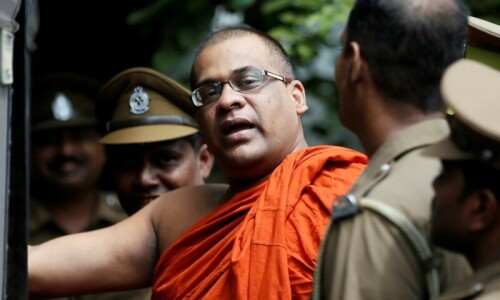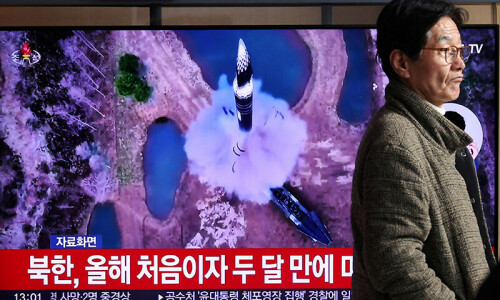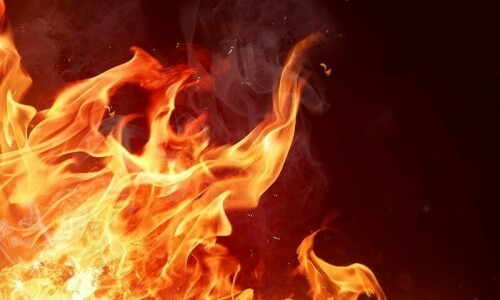TEHRAN: World powers will hold fresh talks with Iran on its nuclear programme on Tuesday, amid raised hopes of a less hardline approach from the Islamic republic's new president.
The two-day meeting in Geneva will be the first such negotiations since President Hassan Rouhani, a reputed moderate, took office in August.
He has pledged to engage the world constructively and to resolve the decade-long showdown on Iran's controversial atomic ambitions.
Western powers and Israel suspect Tehran is developing a nuclear military capability, a claim repeatedly denied by the Iranian leadership.
Foreign Minister Mohammad Javad Zarif has taken over as Iran's top negotiator with the so-called P5+1 group of the United States, Britain, China, France and Russia plus Germany.
But so far he has been tight-lipped on what Iran is prepared to offer in exchange for relief from harsh sanctions which have damaged its ailing economy, hampering the bulk of its oil exports and its vital access to global banking.
“We will present our views, as agreed, in Geneva, not before,” Zarif said in a tweet on Friday.
The government-run “Iran” newspaper, quoting sources close to Iranian negotiators, said Saturday without elaborating that Tehran's proposals would be based on “realistic approaches and acceptable logic”. It also said they would “address some Western concerns”.
Tehran has insisted that it will not back down from what it considers its “right” to operate a uranium enrichment programme on its soil -- which could provide fuel for both civilian and military objectives -- while not ruling out that other aspects of its drive might be up for discussion.
Unnamed Iranian diplomats said “the recognition of the right to enrichment on Iranian soil” would be the end game in Iran's plan, whereas in the past it was more of a non-negotiable precondition to any negotiating framework, ISNA news agency reported.
But there has been no word of possible concessions that Iran might put forward to ease suspicions in the West and Israel.
William Luers, a veteran former US diplomat and director of The Iran Project, an independent initiative to promote dialogue, argues that if Tehran makes a substantive offer at Geneva it could pose a dilemma for Washington, particularly amid Congressional pressure for even stiffer sanctions.
“If at Geneva they outline an interesting plan that might go a long way towards satisfying even over the short term our concerns, then we're going to decide whether simultaneously we do something that will make this deal happen,”Luers told reporters on Friday.
“Then over the next year or two you can reach a more comprehensive deal,” he said.
Behind-the-scenes actors
Accompanied by political directors from the P5+1 group, European Union foreign policy chief Catherine Ashton will represent the world powers at Geneva, with both sides under pressure from behind-the-scenes players.
Israel is urging the West to increase sanctions against Tehran, while also threatening unilateral military action against its atomic programme.
And Rouhani is brushing off criticism from regime hardliners opposed to his recent overtures to the West, including a historic phone call with US President Barack Obama in late September, or possible concessions on the nuclear front.
For now, he appears to have the qualified support of supreme leader Ayatollah Ali Khamenei, who has the final say on all matters of state.
Khamenei has branded nuclear proliferation and possession of the bomb a “sin” against Islam, in a religious decree acknowledged by Obama.
The Geneva talks are likely “to be more open, but also more complicated”, a Western diplomat close to the process told AFP on condition of anonymity.
“Zarif will of course make an ambiguous offer,” said the diplomat, adding that it remains to be seen if the offer “would be something acceptable (as) we know that it is the supreme leader who decides on the strategy and the margins of manoeuvre”.
The last round of nuclear negotiations was in April in the Kazakh city of Almaty, and ended in impasse. But Rouhani's surprise election triumph in June raised hopes of a diplomatic solution to the talks. Russian Foreign Minister Sergei Lavrov was optimistic on Friday.
“The statements of the new Iranian leadership give us reason to think that we will be able to break our deadlock on the issue,” he said.














































Dear visitor, the comments section is undergoing an overhaul and will return soon.